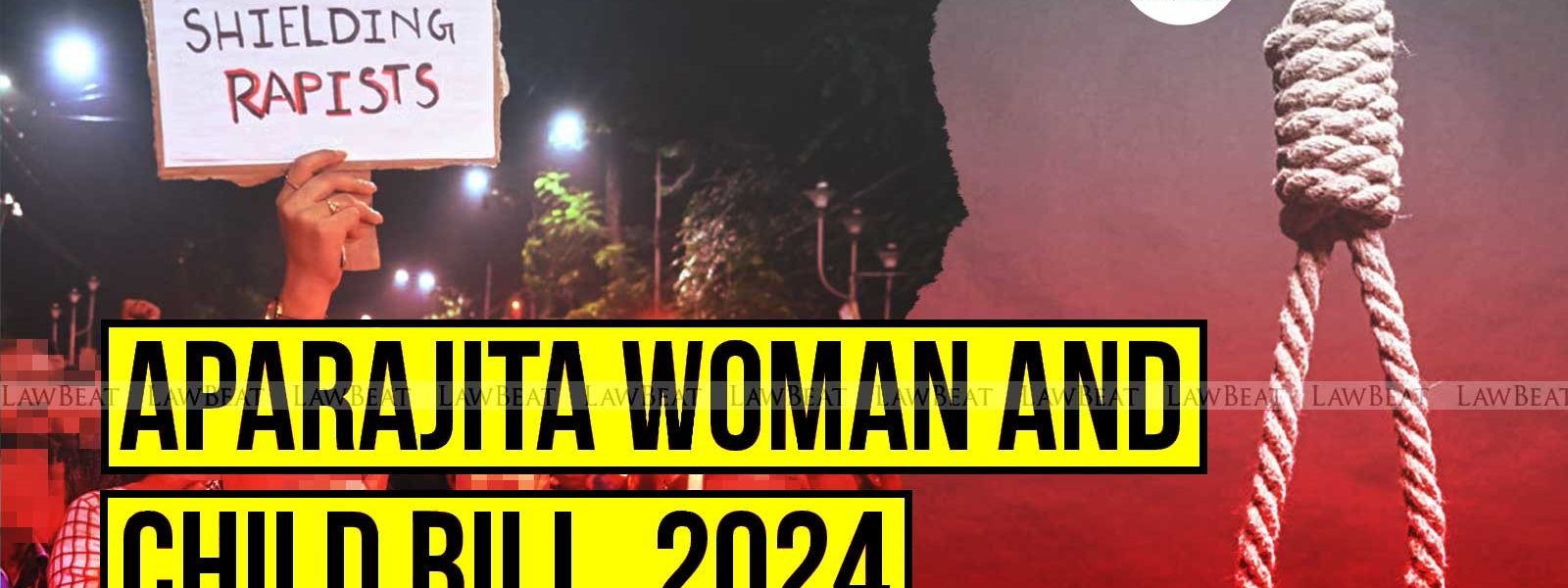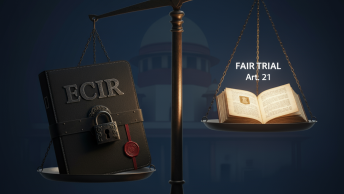Introduction
The West Bengal State Assembly passed the Aparajita Woman and Child (West Bengal Criminal Laws Amendment) Bill, 2024 (“Bill”) amending punishments in the Bharatiya Nyaya Sanhita (“BNS”) for sexual offences, in the wake of rape and murder in Kolkata in August 2024. The Bill provides for harsher sentence range for rape, regardless of their nature and the surrounding circumstances. It places custodial rape and rape by public servants and non-aggravated rape on the same footing, rendering the aggravated categorization meaningless. Further, the sentence range in the Bill significantly removes judicial discretion at sentencing. This article argues that these changes reflect a lack of understanding of sentencing, and the concept of aggravation or mitigation of a crime and strike a blow to Indian feminists’ work in contextualizing aggravations in rape based on power differentials, a feature inherent to custodial rape.
While rape is punishable from ten years to life imprisonment under the BNS, the Bill changes that to a minimum of life imprisonment for the remainder of natural life to death penalty, thereby making rape a non-homicidal offence punishable with death.
Under the IPC/BNS, custodial rape and rape by public servant, and guardians in institutional homes was punished by sentence of twenty years to natural life, as opposed to non-aggravated rape, which was punishable between ten years to life imprisonment. However, the Bill collapses differences between aggravated and non-aggravated categories of rape. Punishment ranges for aggravated penetrative assault and non-aggravated penetrative assault against minors, and ordinary rape and custodial rape, have all become punishable with remainder of natural life sentences or death.
Several problems with this Bill are glaring and have been widely critiqued, including the insertion of a patently unconstitutional provision of mandatory death penalty; and reliance on harsher punishments for rape, despite its unintended role in preventing rape victims from initiating complaints and ensuring a drop in the conviction rate. This article, however, focuses on the problems with blurring the distinction between simple and aggravated from of rape, and argues that doing so has resulted in undoing large amount of work done on contextualizing the crime of rape and the sentencing for it.
Understanding Aggravation and Mitigation in Penal Law
Generally, the harshness of sentencing in penal law is premised on two principles: The harm caused by the crime, and the offender’s culpability. It has been noted that different offences have different levels of harm, warranting levels of punishment proportionate to the harm caused.
In Indian law, BNS provides for different kinds of thefts, kidnapping, bodily hurt etc., both in simple and aggravated forms. Legal systems also give judges the discretion to fix a sentence to take into account the particular circumstances of a case regarding the harm, as well as the culpability of an offender. This is based on individualized justice, and the fact that no two crimes and offenders are ever the same. Through discretion, judges have the leeway to account for case-specific circumstances that mitigate or aggravate the crime while deciding a sentence. Thus, laws that restrict judicial discretion, through mandatory minimum sentences for example, undercut sentencing and the potential to take aggravating or mitigating circumstances into account.
But what circumstances aggravate, or mitigate, a crime? And what factors determine how the law creates certain aggravated subcategories of a crime? This is a context dependent question, determined by considerations such as the sentencing purposes for a certain crime (deterrence, reformation etc.); prevalence of an offence; and unique characteristics to a certain subcategory of an offence that require recognition as a separate subcategory within a crime. An example is the recognition of acid attacks as a separate subcategory of grievous hurt under Section 124 of the BNS, which recognizes its gendered nature with intentions that are typically different from non-aggravated grievous hurt offences.
Aggravation in Custodial Rape
Presently, the scheme of the BNS recognizes rape, and then provides further categories of aggravated rape with higher sentence ranges. This includes rape resulting in death/persistent vegetative state, gang-rape, rape of a pregnant woman etc. Overall, these categories rely on an understanding of aggravation as one involving death of the victim, the duration, an aggravated nature of physical injury, use of weapons, whether it involved gang-rape and other such factors.
The distinction between aggravated and non-aggravated rape can be sourced to an amendment to the IPC in 1983 after a full bench decision of the Supreme Court in Tukaram v. State of Maharashtra, wherein the Court acquitted two policemen accused of raping an Adivasi woman, Mathura, in police custody. During the incident, Mathura, whose husband, employer and brother were asked to wait outside the station, was taken to the police latrines where she was raped, the absence of vocalised resistance formed the crux of the Court’s reasoning in acquitting the accused- spurring protest from academic quarters. This led to the amendment in 1983 to the IPC and the Indian Evidence Act, classifying custodial rape and rape by public servants as an aggravated category of rape, considering the inherent power differentials and the aggravated vulnerability of the victim in those circumstances.
The Unique Character of Custodial Rape as a Crime
Scholars have pointed out power dynamics inherent to custodial rape, including – i) illegal custody through bogus charges, ii) directed at the exploitation of women who occupy other marginalised intersections of caste, religion, or ability. An example is the case of Rameeza Bee who was arrested with her husband on false charges, gang-raped in custody, and implicated in bogus FIRs accusing her of engaging in sex work in 1978. A report also reveals the intersectional discrimination inherent to custodial rapes and the system’s continued failure to initiate complaints or provide recourse to the victims, points to the nature of State power vested on the police, and the sexual politics of this power. These patterns aggravate custodial rape.
Despite its acknowledgment in the law, custodial rape is notoriously underreported. Structural factors contribute to the same as the police often harass victims under false charges; harsher sentence ranges for custodial rape, i.e. twenty years to life imprisonment, disincentivize judges to convict an accused despite meeting evidentiary requirements; proceedings are less likely to be initiated against the police. In rare cases that lead to conviction and reach sentencing, judges fail to acknowledge the power differential, and instead rely on patriarchal myths, such as the victim’s sexual history to make sentencing decisions.
The Aparajita Bill- Striking Further Blows
Even with the abysmal state of custodial rape in the law, the Aparajita Bill takes the state of affairs a few steps behind in two keys ways. One, by providing same sentence for both simple rape and custodial rape, it treats both as equally harmful, despite the aggravation inherent to the latter. Two, as documented earlier, increase in punishment ranges for rape contributes to higher acquittals, withdrawals from prosecution etc. Further, higher punishments do nothing to remedy the actual evil in terms of custodial rape by failing to enable victims to speak out given that offending police officers often harass the victim, or book them under false charges. The Bill is at best redundant for custodial rape, and worse, does away with its recognition as an aggravated category based on power differentials.
Despite compelling reasons, should the Bill have gone ahead and prescribed an even higher punishment range for custodial rape, to prove the law’s recognition of its aggravation? I think not. The Bill’s failings lie in its near total reliance on harsh punishments and mandatory minimums/mandatory sentences to address rape. In a bid to showcase itself as a law that takes rape seriously, the Bill sets a disproportionate and potentially unconstitutional sentence for the lowest/least aggravated forms of rape. By setting this range for the least aggravated forms, the Bill disables discussion to recognize or incorporate sentence ranges for aggravated categories such as custodial rape, gang rape etc.
Conclusion
For custodial rape, the Aparjita Bill is a double whammy; unlike other categories, this category is amongst the few to contextualize aggravation around power differentials and has a legislative history of recognizing the intersectionality of its operation. This is especially important in a system that routinely fails to show accountability for such violence otherwise. Additionally, the Bill frustrates whatever potential judges may have had to recognize power differentials as a point of aggravation in sentencing, by almost totally removing sentencing discretion. While discretion in rape has a poor record of relying on patriarchal myths at sentencing, certain cases, such as the Supreme Court’s decision in Patan Jamal Vali v. State of Andhra Pradesh involving the rape of a blind Dalit girl, use discretion to recognize power differential in rape.
The Aparjita Bill strikes a blow in addressing sexual violence within the aggravated context of custodial rape, through its hyper reliance on harsh punishment regimes, leaving no room for the nuances of aggravation and mitigation to be captured, and failing to address some of the major concerns with custodial rape such as underreporting, lack of evidence, lack of conviction and so on.
Lakshmi Menon, is an Associate at Sentencing at Project 39A, National Law University Delhi.
Ed note: This article has been authored by Lakshmi Menon, an Associate – Sentencing at Project 39A, National Law University Delhi. The author thanks Neetika Vishwanath for her feedback. Views expressed are personal. The article was edited and coordinated by Hamza Khan and published by Baibhav Mishra from the Student Editorial Team.







[…] Posted byLakshmi Menon […]
pomclw
This lifted my spirits
Fast aviator game review with pros and cons
Play without risk of disconnection using mirror
This content feels like warm hug when everything else seems chaotic
Оформите микрокредит онлайн без справок и очередей
В Лаки Джет важна интуиция. Попробуй свои силы на 1WIN.
Always one click away from gaming � via mirror
Welcome to Lucky Jet without regrets.
Gaming without limits starts with a fresh casino mirror link.
I like the efforts you have put in this, regards for all the great content.
Your ability to find hope in difficult situations gives others strength
This brought such joy and positivity to what started as a challenging day
Your voice brings such positive impact to everyone who follows your amazing journey here
Really love this unique approach
Win anytime, anywhere with 1win apk download for your device.
LeonBet bietet t�glich neue Wettm�glichkeiten und attraktive Quoten.